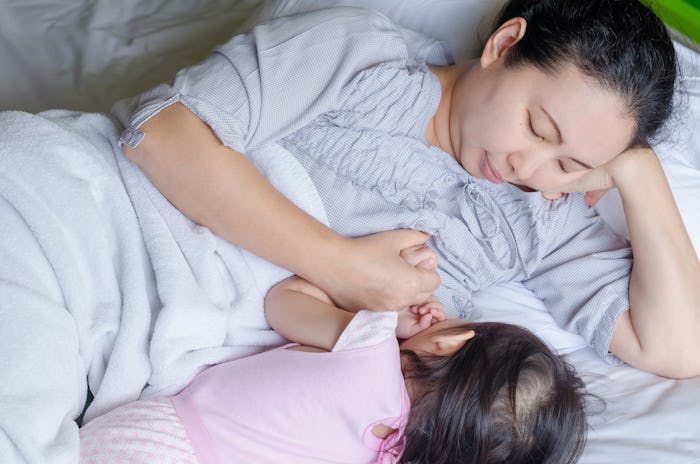Life

Breastsleeping Affects Moms More Than You'd Think
Breastsleeping may sound like the new parenting trend, but it's actually been around forever. It's just been called it different things throughout the years. As the concept makes a resurgence through the parenting world and the newly coined term rises to popularity, many are wondering how this sleeping arrangement impacts everyone involved. Specifically, the ways breastsleeping affects moms later in life.
The term "breastsleeping" originated with sleep expert James McKenna, the director of the Mother-Baby Behavioral Sleep Laboratory at the University of Notre Dame. In his 2015 peer-reviewed article entitled, "There is No Such Thing as Infant Sleep, There is No Such Thing as Breastfeeding, There is Only Breastsleeping," he presented the concept and claimed that it was the safest and most ideal sleep arrangement for new mothers and their infants. McKenna's claim, however, contradicts what the American Academy of Pediatrics (AAP) wrote in its most recent infant sleep recommendations, which is that babies are most safe when they're sleeping in the same room as their caregivers, but not in the same bed.
If you're wanting to give breastsleeping a try, just know that it has not been researched in several rigorous studies nor backed by numerous experts yet. Many experts in the medical community do find McKenna's argument compelling, but some are not ready to denounce the current recommendations put out by the AAP, according to Fit Pregnancy. Experts can only effectively theorize breastsleeping benefits and the future affects of breastsleeping on mothers based off of inferences from available medical research. Although none of these are a guarantee, they are quite fascinating. Here are five ways experts think breastsleeping might impact a mom later in life.
1It Boosts Memories And Learning Long Term
McKenna suggested that breastsleeping mothers are getting more sleep because they're not getting up several times a night every time the baby wants to feed. And you can't deny the benefits of more sleep are undeniable for everyone. According to Web MD, getting adequate sleep can help a person form more memories, think clearer, boost immunity, help mood, and prevent injury.
2It Might Help With Depression And Anxiety
According to La Leche League International (LLLI), breastfeeding stimulates the release of the love hormone oxytocin in mothers. If a mother is practicing breastsleeping, it's assumed that her oxytocin levels are constant and prolonged because the hormones are being stimulated all night. So how does this help? Well, oxytocin has been shown to be effective for treating depression and anxiety, which is prompting medical researchers to study oxytocin as a treatment method for mental illnesses, as explained on Live Science.
3It Could Help Prevent Cancer
Going off the assumption that a breastsleeping mom breastfeeds frequently and through the night, one could assume she reaps all of the long term breastfeeding benefits (if not more than any other group). According to the Dr. Sears website, breastfeeding mothers reduce their risk of breast cancer by as much as 25 percent, as well as her risk of uterine and ovarian cancer as well. Breastfeeding typically halts ovulation and production of estrogen, thereby reducing a woman's exposure to estrogen all together. Less stimulation to the lining of the uterus and breast tissue by the hormone, could mean less risk of cancer in those areas.
4It Prevents Heart Attacks And Stroke
In McKenna's commentary, he referenced a 2013 study from the Cambridge Health Alliance and Harvard Medical School that analyzed maternal disease and a possible link to suboptimal breastfeeding. The study found that frequent and prolonged breastfeeding could help with conditions related to high blood pressure.
5It Lowers The Cost Of Health Care
In the aforementioned study, it was also noted that women who breastfeed less may fall to poorer health overall. Therefore, the health care cost burden on society (and individually) will be higher for these women. Basically, it's assumed that if you frequently breastfeed, for prolonged periods of time, you'll be healthier, and have more money.
As mentioned in the beginning, even though breastsleeping is not a new concept, it has not been rigorously studied yet. Only inferences can be made from existing medical data about it's long lasting effects, but nothing hard lining. If you're interested in learning about the benefits of breastsleeping, the best thing you could do is try it out for yourself to see if it's right for you and your baby.